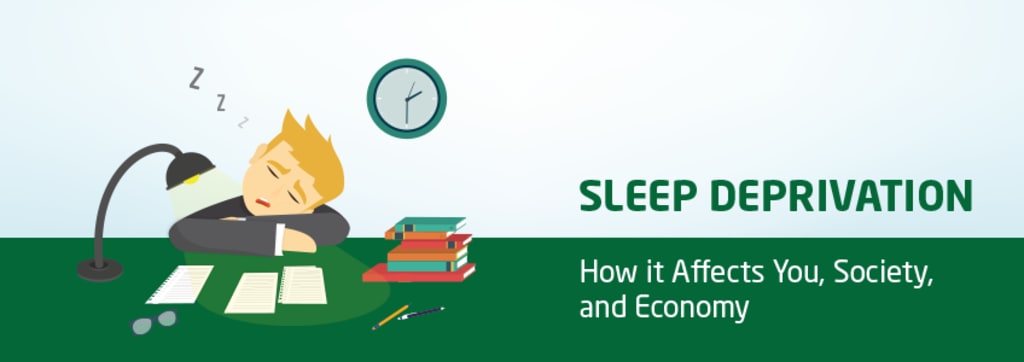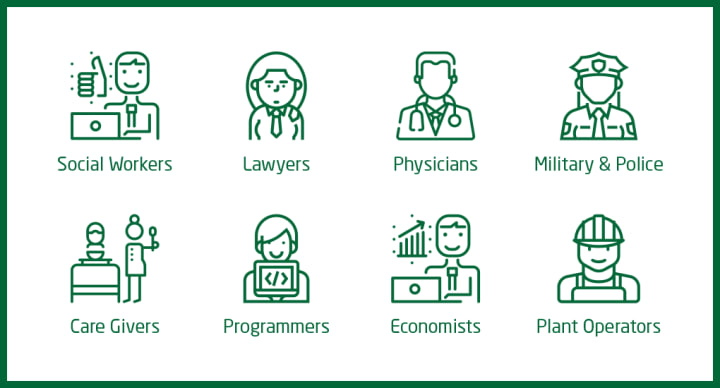Sleep Deprivation
How It Affects You, Society, and Economy - Infographic

Sleep plays a major role in keeping us healthy, alert, and fully functional. In some cases, sleep is more important than food, because without proper sleep, the food that is eaten fails to nourish our bodies. A large percent of the urban population suffers from sleep deprivation. A person who goes without seven or more hours of sleep every night is called sleep deprived. Chronic sleep deprivation can affect people of any age, although it is more common among adults and the elderly.
Children need nine or more hours of sleep every night, while teens need close to nine hours. Adults need seven to eight hours of sleep. The amount of sleep you need doesn’t depend on how sleepy you feel. If you do not get your required quota of sleep every night, you are going to feel sleepy and fatigued during the day, and develop other health issues in time if you are sleep deprived all the time.
Sleep, more than anything else, affects not only our health, but also the society and the economy. Sleep deprivation has turned into an epidemic with hectic work life schedules, and busy lifestyles robbing people of their precious sleep. Nearly 40 percent of children, 90 percent of teens, 70 percent of college-going young adults, and 35 percent of working adults don’t get the required amount of sleep every night. In fact, sleep hardly features on anybody’s list of priorities. For most people, sleep is a waste of time. Staying awake and getting some more work done seems better. But sleep deprivation has far-reaching effects on our health, as well as the society and the economy.
Most sleep deprived professions in the US
You’d be surprised to learn that your occupation can be a major source of sleep deprivation. In every country there are certain professions that require people to work harder than others. The demands of such professions often cut the time that should be devoted to sleep short.
In a survey conducted by mattress company, Sleepy’s, the following were found to be the most sleep deprived occupations in the US.

In the same study, the most well-rested professions were found to be forest loggers, hairstylists, and sales representatives among others. This goes on to show that those with fixed work hours are better rested than those with erratic schedules.
Causes of sleep deprivation
The reasons why people may not get enough are varied. What holds true for one person may not be so for others. Just because someone stays up late, or fails to get to bed early, doesn’t mean they have an unhealthy lifestyle. It may well mean that they suffer from certain conditions that make getting sleep hard. Or there may be people to take care of at home, resulting in poor sleep quality.
Several health conditions are often responsible for poor sleep quality. These include heart problems, kidney disorders, breathing problems, and thyroid issues.
Sleep disorders also form a significant cause of sleep deprivation. Reasons include insomnia, sleep apnea, restless leg syndrome, and narcolepsy.
Erratic work schedules affect our sleep quality more than we can imagine. Staying up late for work or waking up in the wee hours to go to work result in chronic sleep deprivation over time.
For some people, sleeping late is a personal choice. Watching movies or TV shows till late in the night, or finishing pending work is the way of life.
Certain medications interfere with sleep by affecting the production of melatonin, the sleep hormone. Beta blockers and blood thinners are some of the medications affecting sleep.
The sleeping environment is often responsible for disturbed sleep. Ambient noise, lights, temperature, and an uncomfortable bed, all contribute to sleep deprivation.
How sleep deprivation affects your body
If you go without the required amount of sleep for a day or two, you will feel tired and weak. But if you go without sleep night after night, it leads to more serious complications. Mood swings and poor concentration are some of the immediate effects of sleep deprivation. With time, these get more complicated, and lead to hormonal changes, increased or decreased appetite, compromised immunity, and poor memory. When your brain fails to refresh and recharge at the end of every day, it causes foggy memory, and diminished thinking, affecting productivity. If you still fail to change your lifestyle and get enough sleep, chronic sleep deprivation leads to high blood pressure, lowered sex drive, increased risk of heart disease, obesity, and depression. A large number of people in the US and elsewhere suffer from these consequences of sleep deprivation.
How sleep deprivation affects society
The consequences of sleep deprivation are further reaching than we imagine. It also impacts the society by affecting academic performance, creating marital discords, poor performance at the workplace, giving rise to obesity among children and adults, and various other health risks.
How sleep deprivation affects the economy
We might not think of sleep deprivation’s effect on the economy, but it is deeper than we assume. For instance, every year, the economy loses $411 Billion because of sleep deprivation-related issues, including lost 1.2 million work days, loss of $2,280 per employee, per year, per company, costing $100 billion in sleep deprivation treatment, loss of $109 billion because of drowsy driving, and 328,000 vehicular accidents a year.
How to combat sleep deprivation
Loss of sleep is controllable and can also be treated. Aside from getting diagnosed and treated for medical conditions, there are some easy ways to combat sleep deprivation and improve sleep quality including:
Creating a sleep environment: This involves freeing your bedroom from all distractions like the TV, electronics, and work-related stuff. The bedroom should be only for sleeping, not for other purposes. You should also try to remove ambient distractions like noise and lights.
Evaluating the bed: uncomfortable mattresses or bed linen can have a major impact on sleep quality. The mattress is intricately connected to our sleep quality, so the mattress, sheets, and pillows should be suitable for optimal sleep quality.
Avoiding screen time before bed: The blue light from backlit devices hinder the production of melatonin. Therefore, at least two hours until bed time, reduce the time you spend in front of the TV, phone, tablet, or computer.
Giving up bad habits: Cutting down on the consumption of caffeine, alcohol, and tobacco will promote the normal production of melatonin, and also aid in proper sleep. If you cannot give it up, try to avoid the consumption at least two hours before bedtime.
Improving sleep hygiene: More often than not, sleep is all about routine. Going to sleep and awakening at the same time every day, sleeping on clean and comfortable sheets, removing clutter from the bedroom, and eating a light dinner are some of the ways to improve sleep hygiene, and get rid of sleep deprivation.
Sleep deprivation not only affects millions of people around the world, but also affects the society and the economy. If the society, employers, and the general public show greater concern for this condition, it is possible to bring back productivity, and also have everyone getting their full eight hours of sleep every night.
A better understanding can be achieved with the following sleep deprivation infographic.
About the Creator
Sleep Sherpa
Let the Sleep Sherpa Guide You to a Better Night’s Rest.
Authentic reviews of sleep products and sleep technology including mattresses, sheets, sleep trackers, pillows and more.






Comments
There are no comments for this story
Be the first to respond and start the conversation.